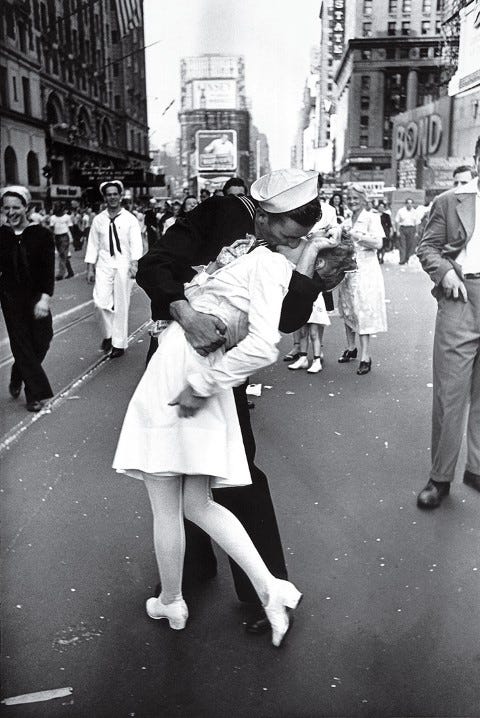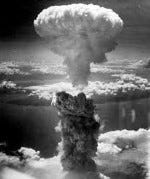Unconditional Surrender an Unconditional Symbol for Sarasota
What's wrong with Sarasota's giant statue of a man kissing a woman? A lot.
The following essay was published in the Sarasota Herald Tribune on September 27, 2020. Since so many people couldn’t read it because of the paywall on the paper’s site, I’m sharing it here on THINK. Would love to know your thoughts on the statue — you can have your say in the comment section below. (Reminder: I usually include cool images in my emails — if they’re not showing up for you, click the OPTIONS box in the upper right hand corner of your email and select “Show remote content in this message.”)
Unconditional Surrender Is Unacceptable Symbol of Sarasota
The photograph that brilliantly captured, and spoke volumes about, the euphoria of V-J Day, August 14, 1945, is the basis for the statue that stands at the bay front of Sarasota.

Humbly titled, "V-J Day in Times Square," the photograph expressed everything its title did not: an exquisite moment of euphoria on a day when gratitude, relief, and jubilance lifted our nation as one.
Seventy-five years later, Sarasota's 25-foot-high, not quite so humbly titled "Unconditional Surrender" statue replicates that moment in history, and also speaks volumes.

But what is it saying?
For the clearest answer -- directly from the mouth of its creator -- we need look no further than the statue's title. Dramatically named for maximum effect by sculptor Seward Johnson, the title, "Unconditional Surrender," overtly refers to the phrase made famous by the 1945 Potsdam Declaration warning Japan of "prompt and utter destruction" if the Allied forces' demand for unconditional surrender wasn't met.

Since the statue isn't a sculpture of an atom bomb mushroom cloud, since it's not an image of warfare at all, and since it is a statue of a man crooking his elbow tightly around the neck of a woman who appears to have gone limp as he bends her backward to plant his lips on hers, we can logically infer that Mr. Seward was referring, with a wink and a nod, to an unconditional surrender of another kind altogether.
Think about those words: "surrender" -- meaning submission or ceasing resistance, and "unconditional"-- meaning the surrendering party has no say in the conditions they are experiencing. Seward knew precisely what he was doing -- what thoughts he would be inculcating -- in the minds of people every time they read or hear the title "Unconditional Surrender."
We already know what at least one person thinks of the sexual politics of the statue: it garnered national notoriety in 2019 after someone spray painted the hashtag #MeToo in bold red letters on the nurse's leg.

But have we ever wondered what our Japanese tourists or residents think of the meaning and historical relevance of its title? Is "Unconditional Surrender" really how we want to welcome visitors to the "cultural coast" of Florida?
Whether Seward named his work to refer proudly to the annihilation of men, women, and children in Nagasaki and Hiroshima or salaciously to the subjugation of women -- is this really the symbol we want representing who we are as a community?
The U.S. at first resisted getting involved in World War II, but we ultimately changed our minds and by doing so, Americans helped save the world. Millions of lives were saved when the U.S. entered the war.
Let that love of humanity -- acted out by the Greatest Generation -- draw a new breath. A breath that hearkens back to the qualities of bravery and boldness so profoundly modeled by the men and women of that generation -- qualities that, as a nation, we need now more than ever.
When you know better, Maya Angelou famously said, you do better. I believe we can do better as a community than having a statue, the very name of which proclaims the quite brutal concept of unconditional surrender. Words and symbols have enormous power, both overtly and covertly. Instead of branding our community as one that crows about unconditional surrender, let's brand it with something that celebrates unconditional respect.
The time for "Unconditional Surrender" has passed.



Your words and thoughts are always a welcome reminder for me to “think”. Thanks MC